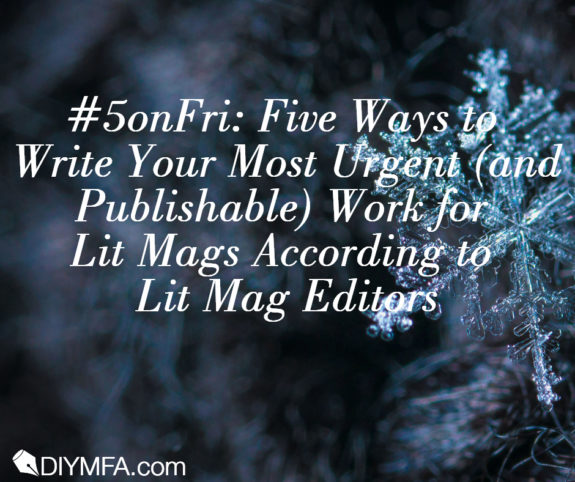In my interviews with literary magazine editors, they tell me they want fresh, vital, and well-revised writing to publish. It’s probably clear to you how to revise your work well. (Hint: find a grammarian-friend.) And it’s also not that hard to figure out what an editor might think of as fresh. (Read journals to see what editors have already published, and you’re halfway there.) But writing work that is vital, with pressing topics and themes that come from the “burning lava pit in the center of your life” as Narratively editor, Lilly Dancyger put it, requires all your writerly powers.
As editors, we want you to write not only the words that only you can write but the words you must write. I know you can do this. Here are five ways to help you.
1) Consume Carefully
The struggle to spend quality-time with literature is real. It’s so easy to instead skim articles online and binge podcasts or the latest “golden-age-of-television” offering.
You don’t need to cloister yourself. Just try for balance. Keep track of how much you create and how much you consume each week. Like, literally write it down. Then let creation top your chart. Careful consumption of media will give your voice and ideas room to breathe and develop.
Try to make the bulk of your reading stories and poems that affect you deeply. To write your most profound stuff, you must drink from the wells of thought-provoking and daring writers. In this way, your writing will become bold and thoughtful, too.
Take this even further by reading specifically to identify urgency in the oeuvres you love. What techniques, images, or forms do the authors use to express exigence? What stokes the fire in their bellies?
2) Spy-Explore
In sixth grade, my favourite book was a manual on how to be a spy. It was also the first year a teacher singled me out with praise for a poem I wrote. These things are connected.
When I interviewed PRISM poetry editor, Shazia Hafiz Ramji, she delightfully called our job as writers the Spy-Explorer. (That squeal you hear is my gleeful eleven-year-old self.) It fits perfectly. As writers, our job is to let readers listen in and to take them places. Spies observe; urgent writing requires we pay attention. Explorers traverse new territory; we do this with words.
You can approach this in a literal way. Take a walk, watch people, visit a location, and drink it all in. Use all your senses to notice anything that will allow you to be more precise in your writing. What do you find beautiful, or repulsive, or magical, or frightening in your world?
Some discoveries may be fleeting thoughts, lost forever if you don’t have a notebook handy. So keep notebooks handy! Track dreams, snippets of conversation, and anything else of significance. Then refer back every so often to see what gems you can polish from your pebble-trails of notes.
Spy-Explorers must also be ready for the occasional fisticuffs. Meaning, we can’t pull punches. The Gravity of the Thing editor, Thea Prieto, told me that in many submissions, writers stop at a critical moment, kind of like a camera crane shot backing off in a film.
Don’t do this. What happens after the moment you want to look away? Hold there.
3) Draw from Your Darkness
The bravest part of writing your most essential words requires facing your shadow self. As Wendy Lesser of Threepenny Review told me, “Really great writers are in touch with their own dark sides, their own destructive sides, and their own cruel sides…they are pouring their own selves, and lives, and unconscious desires, and everything else into their work.”
It takes deep honesty and understanding to draw from your dark side. It calls on you to reveal in yourself or your characters things that might be seen as unacceptable or inappropriate. My colleague, Room magazine’s contest editor, Sierra Skye Gemma, described two comparable entries to a writing contest. Both were on the topic of parenting, but the one she sent to the longlist revealed unexpected feelings that go along with motherhood—things we are not allowed to talk about, like fantasies about what life would be like without our children.
Drawing from your darkness could also entail facing traumatic events. But you needn’t plunder details of the incident. The most revealing, urgent, surprising stories will examine an aftermath. Of course, it can take years to be ready to write around a traumatic event, and Mary Karr’s book The Art of Memoir has an excellent exercise to discover if you’re prepared to write a painful personal story.
4) Slow Down
Do not rush into writing. I know this contradicts the current cultural drive to be productive, but as TNQ editor Pamela Mulloy said, “Writing is a process that requires a great deal of patience and revisiting and rethinking.”
Pre-writing, the time you take to mull things over, to argue with yourself, and to inventory your ideas, will make your writing richer before you even begin to put words on a page. Your pre-writing practice could include mind mapping ideas, drawing a story arc, or mentally interviewing your protagonist.
Ironically, going slower will make you faster. When you take the time to create thoughtfully, listen to and learn from your writing, and allow it to lead you to new places, you’ll become a more efficient writer. Your future compositions will come together more quickly.
Also, don’t be in a hurry to send your work out. Give time between several revisions to allow the work to breathe. (But definitely send it out when you’ve done all you can.)
“When I think something’s about 90% done, it’s really 50% done,” The Forge editor John Haggerty said in reference to his own writing.
5) Make it Mean Something
The revision stage is also the time to understand and further develop the central questions of your work. If you’re consuming carefully, spy-exploring, drawing from your darkness, and going slowly, your work will already have some nascent themes. Uncover them by looking for clues like structure, sounds, word choices, and literary devices.
Do you notice any patterns or recurring images, like objects that frequently show up, repeating places, or repetitions in dialogue? Once you find central themes in your writing, shore them up. Amplify (subtly) the images, colours, and sensory descriptions that most impact this broader meaning.
“I have a practice now of writing revision narratives where I look at a poem and/or essay that I’ve written and sort of talk out why it is organized the way I have, and what questions it raises for me, what discoveries I’ve made in the process of putting it together, and how it might be strengthened by a shift in simile or linebreak or prosity,” [PANK] editor Maya Marshall told me.
Doing this will give editors and readers the opportunity to learn something, ask new questions, and connect meaningfully with your words. And isn’t that why you do it?
I expect this list seems a little daunting, but I hope that you take it like the best Spy-Explorers: as a challenge and adventure! I promise you that by following this list, you’ll write your most vital, urgent work. It will allow you to continue writing for a long time, with editors and readers drawn to your words.
 Author and literary magazine editor Rachel Thompson is the host of Lit Mag Love: A Podcast for Creative Writers Who Want to Publish.
Author and literary magazine editor Rachel Thompson is the host of Lit Mag Love: A Podcast for Creative Writers Who Want to Publish.







